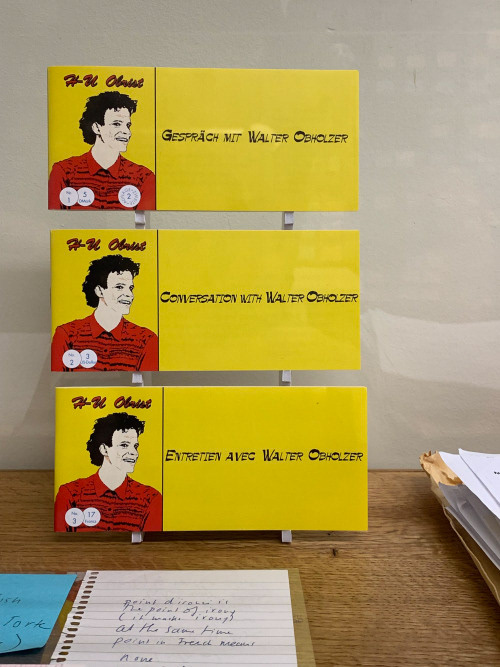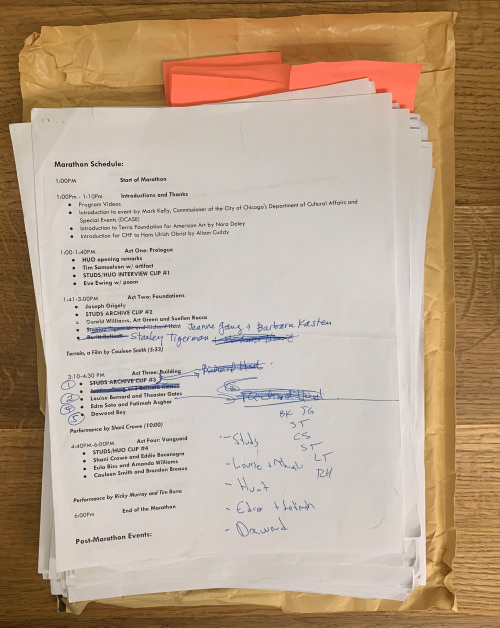The Hans Ulrich Obrist Archive of publications and publication projects consists of a comprehensive collection of the publications and related ephemera produced by the curator Hans Ulrich Obrist. The documents begin in 1991, when Obrist organized his first show, The Kitchen Show, in his apartment in St. Gallen, Switzerland, and continue to the present. The collection totals over 104 linear feet. The archive is maintained by Joseph Grigely, an artist and textual scholar, and Professor of Visual
and Critical Studies at the School of the Art Institute of Chicago. In the summer of 2014, the archive was moved from Grigely’s studio to MacLean 705 at the School of the Art Institute of Chicago. Here the archive is stored, and research activities and vitrine exhibitions based on the archive take place. MacLean 705 is also used by the Department of Visual and Critical Studies for tutorials, meetings, and related institutional events, the projects alternately foregrounding and backgrounding activities of the room. The budget for the archive is minimal, and administrative support is likewise incidental: the space is open when the door of MacLean 705 is open, and by appointment.
and Critical Studies at the School of the Art Institute of Chicago. In the summer of 2014, the archive was moved from Grigely’s studio to MacLean 705 at the School of the Art Institute of Chicago. Here the archive is stored, and research activities and vitrine exhibitions based on the archive take place. MacLean 705 is also used by the Department of Visual and Critical Studies for tutorials, meetings, and related institutional events, the projects alternately foregrounding and backgrounding activities of the room. The budget for the archive is minimal, and administrative support is likewise incidental: the space is open when the door of MacLean 705 is open, and by appointment.
HUO Archive at Maclean 705
The conversations and interviews of Hans Ulrich Obrist encompass a broad practice that is dialogic in relation to both words and disciplines. In Ways of Curating (2014), Obrist observed that art should function as a lifelong conversation. His first book-based interview, with Walter Obholzer, was published in 1991, and has been followed by almost one thousand interviews with artists, scientists, and writers, in a global array of languages. Obrist is co-founder of the Brutally Early Club, the Hyper Early Club, and the Reasonably Early Club, all of which are based on conversational exchanges. This installation collects together narrative elements from interviews, conversations, and correspondence, as well as Obrist’s prized interview tools, Olympus VN-8600PC digital voice recorders, which have since been replaced by Olympus WS-853 recorders.
Conversations and Interviews 1991-present

Hans Ulrich Obrist, “Gespräch mit Walter Obholzer.” Printed in German, French, and English. Wien: Galerie Metropol,1991

Hans Ulrich Obrist, The Chicago Interview Marathon Notes, September 2018
Hans Ulrich Obrist, Conversations with Joseph Grigely, 1995-present
Calling cards for the Hyper Early Club (3:30am), the Brutally Early Club (6:30am) and the Reasonably Early Club (7:45am)
Four Olympus VN-8600PC voice recorders, retired
The archive on September 20, 2019
Images are courtesy from the HUO Archive website